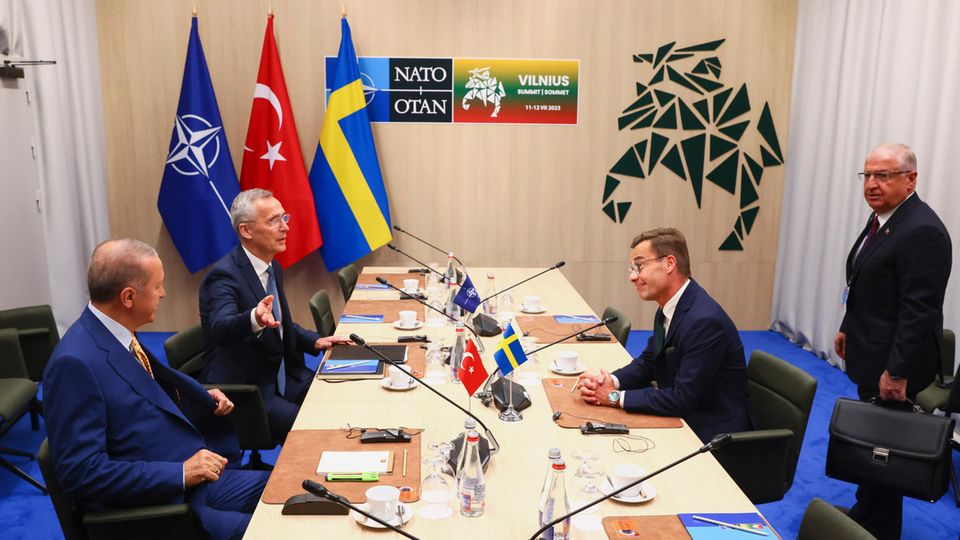questions and answers
A new deal and many question marks: Will Sweden actually become a NATO member after Erdogan’s okay?
Breakthrough: Recep Tayyip Erdogan (l.), President of Turkey, NATO Secretary General Jens Stoltenberg (middle) and Ulf Kristersson, Prime Minister of Sweden at their meeting in the run-up to the NATO summit in Vilnius
© Yves Herman/Pool Reuters/AP/DPA
Can Sweden join NATO? Shortly before his departure for the alliance summit, Turkish President Recep Tayyip Erdogan made an apparently unfulfillable condition for his yes. Shortly thereafter, he announces a breakthrough. That raises questions.
However, it is uncertain whether it will actually happen quickly. Because memories of a similar agreement shortly before the NATO summit last year are awakening.
What exactly happened on Monday?
Stoltenberg, Kristersson and Erdogan spent several hours on Monday discussing how Turkish reservations about Sweden’s admission to NATO can be addressed. Kristersson eventually agreed to a lengthy explanation. Sweden has therefore committed itself to submitting a counter-terrorism plan. This is the country’s response – in addition to steps already taken – to Turkey’s accusation of not taking sufficient action against “terrorist organizations” such as the banned Kurdish Workers’ Party PKK.
In addition, Sweden has declared its readiness, among other things, to intensify economic cooperation and has promised Turkey to actively support a revival of the EU accession process that has been put on hold. The same applies to the negotiations on an expansion of the customs union and visa-free travel for Turkish citizens, which have also not made any progress for years. A few hours earlier, Erdogan had surprisingly made his country’s approval of Sweden’s admission conditional on Turkey’s EU accession process, which had been put on hold for years, being resumed.
Is rapid progress really conceivable on the subject of EU accession?
No. For years, the EU has accused the political leadership in Ankara of disregarding democratic and rule-of-law standards. Turkey’s admission to the EU is therefore considered illusory for years to come, even though EU Council President Charles Michel tweeted on Monday that he would be accommodating and announced that opportunities should be explored to cooperate more closely again and give relations new energy.
So why does Erdogan still agree with this statement?
That is unclear. Perhaps he could no longer maintain the blockade for economic reasons and now wants to sell Sweden’s concessions as a short-term success. Erdogan needs the West’s help to mobilize new investments. Turkey is struggling with massive inflation and also faces the mammoth task of financing reconstruction work in the affected regions after the devastating earthquakes in February.
military alliance
From the Cold War to the Russian invasion of Ukraine: the history of NATO
What does the deal mean for NATO?
Monday evening’s statement is a great relief for the alliance. The summit meeting in Vilnius on Tuesday and Wednesday threatened to be overshadowed by the dispute over the blocking of Sweden’s accession. Now the heads of state and government can concentrate on the actual topics of the summit. Above all, this includes supporting Ukraine, which was attacked by Russia, and strengthening its own deterrence and defense capabilities.
How to proceed now?
In the ideal case for Sweden, Erdogan will send the accession protocol to the Turkish parliament very shortly, and the MPs will approve it before the parliamentary summer recess. Then Sweden could be the 32nd member of the alliance in the fall. Based on previous experiences with Erdogan, however, there are also fears that he could at some point complain about a different interpretation of the agreement and then demand, for example, that Sweden must actively campaign for his country’s EU membership before the Turkish parliament approves it. Even before the NATO summit last year, it looked as if the Turkish blockade was passé and the way for Sweden’s membership was clear – which was not the case: the agreement announced by Stoltenberg turned out to be a fallacy.
On the other hand, what is no longer considered a major risk factor is that, along with Turkey, Hungary has not yet ratified Sweden’s accession protocol. In NATO it is assumed that the government in Budapest does not want to be held responsible for further delays.
What is at stake for Sweden?
As long as the Scandinavian EU country is not a NATO member, it cannot request military assistance under Article 5 of the NATO treaty in the event of an attack from outside. At the same time, excessively large concessions to Turkey could harbor domestic political risks and play into the hands of opponents of NATO membership. Like Finland, Sweden only applied for NATO membership in the spring of 2022 under the impression of the Russian war of aggression against Ukraine. For decades, both countries had previously struggled to reach a broad consensus on the issue and had always refrained from applying for membership due to divided opinions among the people and politicians.
And for NATO?
According to military experts, an expansion of the alliance would benefit the defense of northern Europe. Accession would therefore be particularly attractive for strategic reasons, because then the entire Baltic Sea coast – with the exception of the coast of Russia and its Kaliningrad exclave – would be part of NATO territory. This could, for example, make it easier to defend the Baltic States in the event of a Russian attack, because in future troops and equipment could be transported much more easily by ship to Estonia, Latvia and Lithuania via Sweden. The huge Swedish Baltic Sea island of Gotland plays a particularly important role here.


